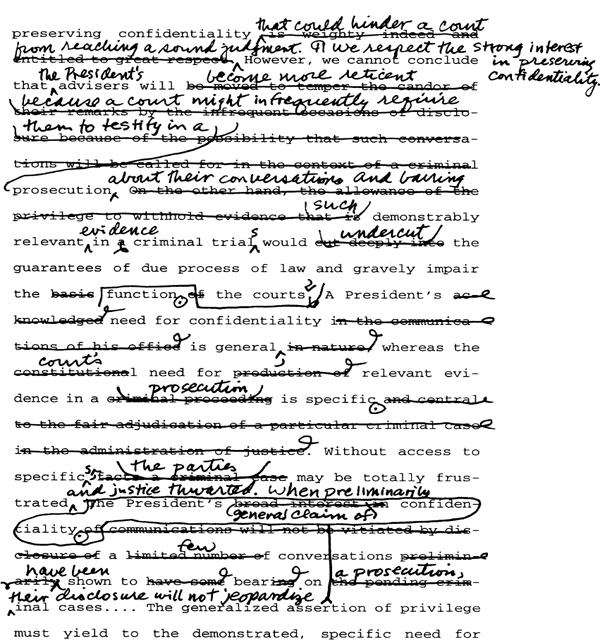– Revising your Prose


the demonstrated, specific need for evidence in a pending criminal trial.
EDIT 2: The President’s claim to an absolute executive privilege depends on the strength of our historic commitment to “the rule of law,” a commitment most profoundly shown in our view that “the twofold aim [of criminal justice] is that guilt shall not escape or innocence suffer.” In our system, adversaries must develop all relevant facts and contest all issues. If courts reached judgments without all the facts, criminal justice would be defeated. Integrity of the judicial system and public confidence in it depend on the fullest disclosure of facts consistent with the rules of evidence. Justice requires that courts be empowered to compel witnesses to produce evidence needed by either party.
In this case we must balance two interests: privacy of presidential communications and the court’s need for disclosure. We must choose between a policy of disclosure that could imperil the President’s ability to carry out his responsibilities and a policy of preserving confidentiality that could hinder a court from reaching a sound judgment.
We respect the strong interest in preserving confidentiality. However, we cannot conclude that the President’s advisers will become more reticent because a court might infrequently require them to testify in a prosecution about their conversations. And barring such demonstrably relevant evidence in criminal trials would undercut the guarantee of due process of law and gravely impair the courts’ function. A President’s need for confidentiality is general, whereas the courts’ need for relevant evidence in a prosecution is specific. Without access to specifics, the parties may be totally frustrated and justice thwarted. When a few conversations have preliminarily been shown to bear on a prosecution, their disclosure will not jeopardize the President’s general claim of confidentiality…. The generalized assertion of privilege must yield to the demonstrated, specific need for evidence in a pending criminal trial.
We spent more than an hour editing this passage. In edit 1 we untangled the sentences but left most of the verbiage undisturbed. In edit 2 we hunted down redundant and windy phrases; for all the changes we made, we discussed and discarded many more. After two rounds of editing, we had cut the original (405 words) by about 25 percent (to 297 words). (We reproduce a handwritten version so that you can follow our trail.)
In both edits, we strove to preserve the court’s tone. Had we chosen to alter the tone and sharply simplify the passage, we would have a 77- word summary, a little more than one-sixth of the original.
SUMMARY: The President asserts that presidential advisers will not be candid if they know that their conversations might be disclosed in court. His position is entitled to respect. But his claim is general and cannot outweigh a court’s need for specific information that, at least preliminarily, has been shown to be relevant to the pending prosecution. Without all the facts, our adversary system of criminal justice could not work. Public confidence and judicial integrity depend on full disclosure.
Only the clock can tell you when to stop editing. “We must check our writing right up to the moment of deadline,” wrote James J. Kil-patrick, who called this advice “perhaps the most important of all” for writers. We endorse his call for rigorous editing and proofreading, as we do so much else in his admirable book The Writers Art. But just a few pages later, Kilpatrick misstates the title of Theodore Bernstein’s book on outmoded rules of English usage, transforming Miss Thistle-bottoms Hobgoblins into Miss Throttlebottom‘s Hobgoblins.10 Bernstein said he gave the book this peculiar name in part because he believed “that a title so hard to pronounce and so hard to remember will be difficult to forget.”
No matter how diligently we may edit, errors, like stubborn weeds in a garden, infest our prose. The only remedy: Edit again.
< div class='tao-gold-member'>